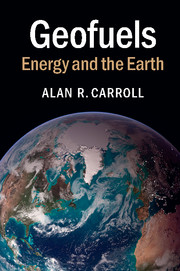Book contents
- Frontmatter
- Contents
- Acknowledgments
- 1 Introduction
- 2 The Living Earth
- 3 Warmed from Above: Solar Energy
- 4 Wind, Water, and Waves: Energy from the Fluid Earth
- 5 Covered in Green: Biofuels Basics
- 6 Fossil Farming: The Geologic Underpinnings of Biofuels
- 7 The Light of an Ancient Sun: Fossil Fuel Origins
- 8 Digging for Daylight: Coal and Oil Shale
- 9 Skimming the Cream: Conventional Oil and Gas
- 10 Stuck in the Mud: Fossil Fuels That Fail to Flow
- 11 Petrified Petroleum: Oil Sand and Gas Hydrate
- 12 Water, Water, Everywhere
- 13 Primordial Power: Geothermal and Nuclear
- 14 Out of Sight, Out of Mind: Geologic Waste Disposal
- 15 How Long Is Forever? Energy and Time
- 16 Conclusions
- Index
16 - Conclusions
Published online by Cambridge University Press: 05 March 2015
- Frontmatter
- Contents
- Acknowledgments
- 1 Introduction
- 2 The Living Earth
- 3 Warmed from Above: Solar Energy
- 4 Wind, Water, and Waves: Energy from the Fluid Earth
- 5 Covered in Green: Biofuels Basics
- 6 Fossil Farming: The Geologic Underpinnings of Biofuels
- 7 The Light of an Ancient Sun: Fossil Fuel Origins
- 8 Digging for Daylight: Coal and Oil Shale
- 9 Skimming the Cream: Conventional Oil and Gas
- 10 Stuck in the Mud: Fossil Fuels That Fail to Flow
- 11 Petrified Petroleum: Oil Sand and Gas Hydrate
- 12 Water, Water, Everywhere
- 13 Primordial Power: Geothermal and Nuclear
- 14 Out of Sight, Out of Mind: Geologic Waste Disposal
- 15 How Long Is Forever? Energy and Time
- 16 Conclusions
- Index
Summary
What's past is prologue.
William Shakespeare, The TempestIt should be clear by now that the past geological evolution of the Earth has directly influenced the present and future availability of all energy resources, in one way or another. This connection is obvious for fossil fuels, nuclear, and geothermal energy, all of which exploit the tremendous natural leverage of geologic time. In contrast, renewable systems rely solely on contemporary energy fluxes, which are very large in their own right. The evolution of the Earth has literally set the stage for their use, however, by shaping the geography of practical renewable energy. It has also predetermined the availability of nonrenewable Earth resources that are required to obtain renewable energy.
This dependency on the geologic history of the Earth places intrinsic limitations on all energy systems. Note that these limitations are not static, but instead evolve continuously through time. Three overarching principles govern the changing relationships among humans, energy, and Earth resources, as detailed in the following.
Quality, Not Quantity
Our voracious energy appetite has stimulated spirited debate over the ultimate quantities available from different sources, motivated by concerns that supplies might eventually fall short of demand. In a gross sense this concern is misplaced, however. For example, the total amount of solar power reaching the Earth exceeds current human power consumption by a factor of more than 10,000. The total amount of energy stored in organic matter buried in the Earth's crust is on the order of five thousand times greater than the presently recognized magnitude of fossil fuels. Various other energy systems hold similarly mind-boggling surpluses. The Earth clearly has plenty of energy. What matters therefore is not quantity, but quality. Energy quality can be defined in many ways; in the present context it represents the relative potential for doing useful work, at a minimal cost.
- Type
- Chapter
- Information
- GeofuelsEnergy and the Earth, pp. 342 - 346Publisher: Cambridge University PressPrint publication year: 2015



